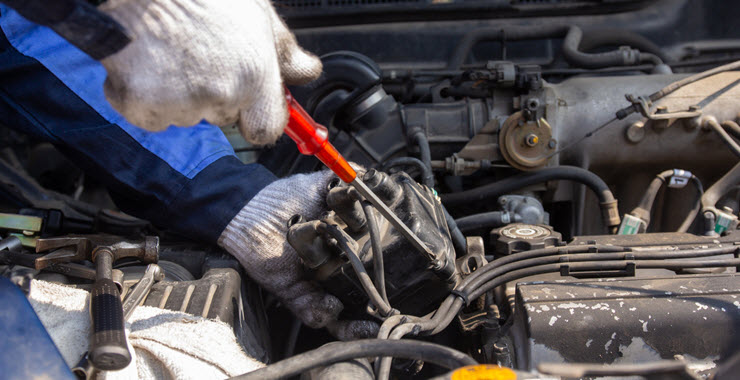Audi is known for their luxury and performance vehicles, and a key to ensuring they maintain their high standards for drivers is to have a functioning ignition system. In fact, this is so crucial that problems with the ignition system can even lead to a no-start condition.
It’s important to understand how the ignition system works in general to know why they are so crucial to the overall drivability of your vehicle. There are multiple types of ignition systems, although the electronic system is commonly used in modern vehicles. Older Audis might use the distributor system, for example: the 1988-1991 Audi 90. It is a good idea to know the type of ignition you have, because it impacts the recommended maintenance intervals and parts that need to be serviced.
Regardless of which ignition system your Audi has, the basic concept remains the same. The goal is to send a spark to ignite the air/fuel mixture in the combustion chamber of your engine. The electrical current crosses the spark plug gap, which is how the spark itself is produced. This is a critical part of the 4-stroke engine cycle (intake, compression, power, exhaust), meaning that any error in performance of the ignition system will also impact the other portions of the cycle, leading to poor drivability if the car even remains able to be driven.
It’s clear that ignition systems play a very important role in keeping your Audi running well, but how often should you take your car in to be inspected/serviced for ignition issues?
Recommended Ignition System Service Schedule for Your Audi
Your owner’s manual should provide a maintenance schedule for your specific model. This gives you an idea of how often the system must be serviced, but it’s important to be aware of signs and symptoms that something is wrong so you can act sooner rather than later.
If you happen to drive a classic Audi with conventional ignition, be mindful that it’s often recommended to have the ignition system inspected every 5,000 to 10,000 miles. It also features a physical distributor cap, which needs to be addressed.
Newer vehicles use electronic ignition systems, where some have a distributor, whereas others do not and are known as distributor-less. For electronic systems with distributors, the system should be inspected around every 25,000 miles, and it’s advised to be inspected at every 100,000 miles for systems without a distributor. It’s a good idea to know which type you have so you’re aware of which parts might need service.
Although following the manufacturer guidance on when to have systems inspected is generally advised, it’s important to be aware of what to look out for in case issues pop up before recommended service intervals. This helps you avoid further damage and thus more expensive repairs. These include that the car is hard to start (or doesn’t start), poor drivability (accelerates sluggishly, maybe sputters), or unusual noise from the engine bay (when the engine sounds different than it normally does, this can be an indicator it is running rough).
Multiple issues can lead to things like hard starts in addition to ignition system problems (such as a failing starter motor, low voltage in your battery, etc.), making accurate diagnosis a rather complicated matter. If any of these signs are noticed prior to the advised service interval, it’s best to have your Audi looked at by a trained technician to ensure any problems are fixed before they lead to further damage.

Escondido German Auto for your Audi’s Service
Escondido German Auto is a leader in providing care for European vehicles such as BMW, Mercedes-Benz, MINI, Porsche, Sprinter, Volkswagen, and yes, Audi, with ASE certified technicians and manufacturer approved parts. We understand how hard it can be to diagnose your car’s issue, and we pride ourselves on helping you do so with honesty and integrity!
We are located at 554 E. Grand Ave. in Escondido, CA 92027, and also serve nearby areas of Rancho Bernardo and Valley Center, CA.
To schedule an appointment, call us at (760) 741-3905 or use our website scheduler. Please note that appointments have to be approved, so if requesting online, wait up to 48 hours to hear back. If you need immediate assistance, please give us a call. We are happy to speak with you!

